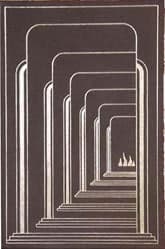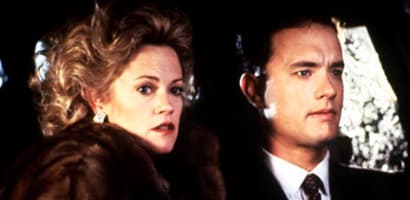The Bonfire of the Vanities
Critique • Quotes • At the movies
 First edition
First editionThe Bonfire of the Vanities
First publication
First draft 1984–1985, Rolling Stone magazine
First book publication
1987
Literature form
Novel
Genres
Literary
Writing language
English
Author's country
United States
Length
Approx. 267,000 words

Melanie Griffiths and Tom Hanks head for the flames in The Bonfire of the Vanities film.
Hold the bonfire—it's not that bad
The Bonfire of the Vanities (1990): Film, 126 minutes; director Brian De Palma; writer Michael Cristofer; featuring Tom Hanks, Melanie Griffiths, Bruce Willis, Kim Cattrall, F. Murray Abraham, Morgan Freeman
A movie usually doesn't suffer much public criticism for differing from the book it's based on. The thousands of readers who make a serious novel popular are nothing compared to the millions that see a hit film without having read the book. Most readers, even if they like to say "The book was better", understand film is a different medium from print with its own standards and they accept a certain amount of revision to fit twenty hours of reading into a ninety-minute visual presentation.
But the movie adaptation of The Bonfire of the Vanities was hated. I mean, HATED.
For one thing, the book has been read and loved not just by thousands but by millions—a rare serious novel whose readership might compare in size to a movie audience. So a lot of filmgoers out there can tell you about the film's every departure from the original text.
For another thing, there are plenty of departures from the original text. Some of them may not seem to make much cinematic sense but, in defence of screenwriter Michael Cristofer and director Brian De Palma, many of these changes are unavoidable. Tom Wolfe's novel gets inside the heads of each of the characters in his huge cast and the fun comes from us experiencing their internal machinations as they rationalize whatever devious behaviour is in their self-interest. In the film we have no access to this interior turmoil except through the characters' outlandish behaviour. We are left with the bare bones of the plot serviced by actors going way over the top.
I think this could have worked if it were clear that we were viewing fantasy worlds seen through the characters' eyes. Sherman McCoy as the Master of the Universe bestriding the world of finance before being brought low by the rabble. The District Attorney standing for the people, slaying injustice, while furthering his squalid political ambitions. The preacher working in God's mysterious ways to bring freedom to his people and cash into his pocket. It could have been a great satire as these self-images clashed.
But viewed entirely from outside, these characters are just cartoons. They vamp from realistic dialogue to surreal explosions of confession. One moment the DA (F. Murray Abraham) seems politically shrewd and the next he's screaming his ulterior motives to his entire staff. Sherman (Tom Hanks) is such an out-there putz that that you can't figure how he could ever have been considered anything else.
A hit and and run in the South Bronx in the adaptation of The Bonfire of the Vanities.
The biggest offender is probably Peter Fallow, Wolfe's British alcoholic society journalist turned by the film into an American alcoholic tabloid writer played by Bruce Willis. The whole story is now framed by Fallow having written a celebrated novel about the Sherman McCoy saga, making him more like Tom Wolfe than a character in his own right. Not a bad idea maybe, but nothing Fallow does or says in the movie fits in with anything else he says or does in the movie. You can't tell what his attitude toward McCoy is from moment to moment because I don't think the screenwriter or actor knows what his motivation is from moment to moment, except to move the story along with occasional voice-overs. Even that doesn't make sense, as Fallow couldn't possibly know all the events as they're depicted.
Softening the edges
Oddly, one of the oft-heard criticisms of the movie is that it turns all the characters into grasping swine. Yet the beloved novel is much worse in this regard. The movie repeatedly softens the edges in an ill-advised effort to make it more palatable. Sherman's rigidly moralistic father has a supposedly touching reunion with his son. Apart from cheating on his wife, Sherman is more sinned against than sinning.
Worst of all, the ending is destroyed. Granted, the novel's conclusion is an anti-climactic downer. But the film provides the typical Hollywood happy ending, complete with a ridiculously earnest speech about "decency" by the judge (Morgan Freeman) facing down an angry crowd in a manner reminiscent of a hundred westerns in which the town's one upright citizen shames the lynch mob.
The Bonfire of the Vanities tries to be both a blackly humorous, surreal take on liberal values in the 1980s and an uplifting, mainstream, liberal film. It ends up being a mess.
Still, it's not as big a mess as critics contended. Not one of the worst films ever made. Just a mediocre flick that seems worse because expectations had been so high.
— Eric

